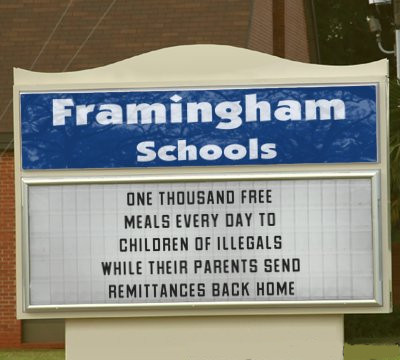
| Framingham School Committee acts on new meal policy | July 28, 2018 |
|---|---|
| Jim Haddadin 617-863-7144 | Metrowest Daily News |
|
FRAMINGHAM - After studying the issue earlier this summer, School Committee members are preparing to adopt new guidelines for the school meals program that ensure no child goes hungry at breakfast or lunch.
The School Committee last week voted to approve the first reading of a new meals policy, which outlines how the district will respond when students don't have money to pay for meals. Under the policy, which closely resembles temporary measures put in place earlier this year, no student with a negative account balance is denied a single lunch or breakfast meal. Meals are still charged to the student's account, though it falls on parents or guardians to settle any outstanding charges. Staff are instructed not to make students aware of a negative meal account balance during the checkout process, nor to single them out or treat them differently. "This is between parents and the school district," School Committee member Tiffanie Maskell said, "so no child should be held accountable for the actions of their parents." Under past practice, students at Framingham High School and Cameron, Fuller and Walsh middle schools were allowed to run up a maximum deficit of $10 in their meal accounts. Once they hit the cap, students were denied meals when they reached the end of the lunch line. School Committee members voted in late April to end the practice, saying it humiliates students and deprives them of the nutrition they need to succeed in school. Since then, school officials have worked to revise the meals policy to reflect the district's new position, informed by federal guidelines and legal mandates. Scott Wadland, who chairs the school board's policy subcommittee, said an internal working group used a model policy published by the Massachusetts Association of School Committees as a guide. The subcommittee adopted language from the MASC, but stripped out punitive measures in the model policy that restrict students from participating in activities if their balances aren't settled. The changes could help many students who don't qualify for free or reduced lunch, but nevertheless come from households in which money is tight. At the close of the last school year, officials said about 350 middle school and high school students carried negative balances in their accounts. Their debts were expected to top $50,000 by the end of the year. Framingham already covers the cost of meals for elementary school students who can't afford to pay. The district anticipates that figure will reach about $28,000 this year. The food service department previously denied meals to students because the school lunch program is federally funded, and receives no money from the city. The National School Lunch Program does not provide flexibility for students to bring in money later, meaning when students can't pay for a meal, it falls on the school district to pick up the cost. Wadland said school officials have yet to decide how to pay for school meal debts that go unpaid in the coming year. "When we wrote the policy, we purposely kind of left that open because there are a number of different ways of approaching it," Wadland said. Since the issue surfaced publicly in April, Wadland said the district has received offers from people in the community to provide financial contributions to help offset costs. He said the district is hoping to find "creative solutions" to fund the meals program that avoid transferring money from the operating budget. "We have always had unpaid meal balances that we need to reconcile," he said, "and so this does contemplate that there will be somewhat of an increase in that, but we also purposely left language in the policy that those balances still are the responsibility of the parent and the guardian, and that we will continue to pursue collection." Wadland said the School Committee will monitor unpaid meal debts during the coming school year and continue to discuss added expenses. "We thought it was more important in the meantime to make sure that our students are fed and that food insecurity is not contributing to their academic performance in a negative way," he said. |
|

Send comments to:
 hjw2001@gmail.com
hjw2001@gmail.com
|

|





